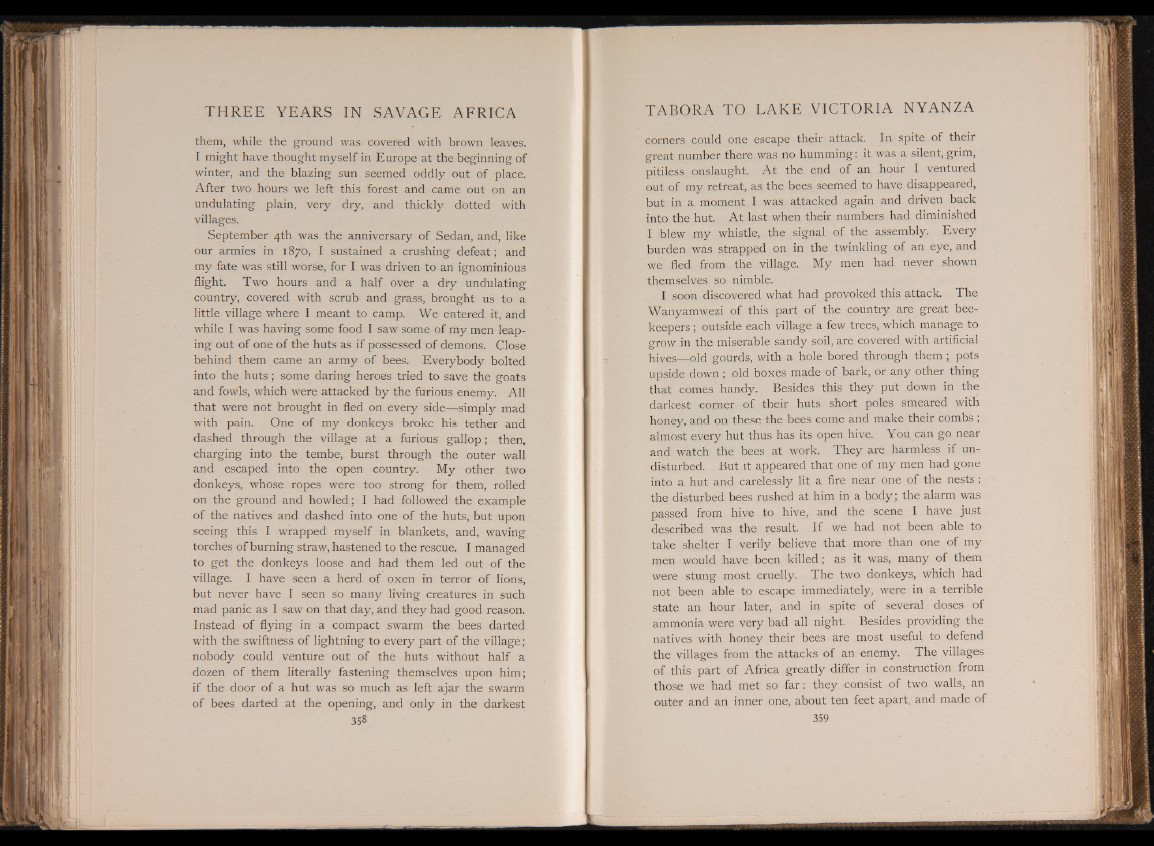
them, while the ground was covered with brown leaves.
I might have thought myself in Europe at the beginning of
winter, and the blazing sun seemed oddly out of place.
After two hours we left this forest and came out on an
undulating plain, very dry, and thickly dotted with
villages.
September 4th was the anniversary of Sedan, and, like
our armies in 1870, I sustained a crushing defeat; and
my fate was still worse, for I was driven to an ignominious
flight. Two hours and a half over a dry undulating
country, covered with scrub and grass, brought us to a
little village where I meant to camp. We entered it, and
while I was having some food I saw some of my men leaping
out of one of the huts as if possessed of demons. Close
behind them came an army of bees. Everybody bolted
into the huts; some daring heroes tried to save the goats
and fowls, which were attacked by the furious enemy. All
that were not brought in fled on every side—simply mad
with pain. One of my donkeys broke his tether and
dashed through the village at a furious gallop; then,
charging into the tembe, burst through the outer wall
and escaped into the open country. My other two
donkeys, whose ropes were too strong for them, rolled
on the ground and howled; I had followed the example
of the natives and dashed into one of the huts, but upon
seeing this I wrapped myself in blankets, and, waving
torches of burning straw, hastened to the rescue. I managed
to get the donkeys loose and had them led out of the
village. I have seen a herd of oxen in terror of lions,
but never have I seen so many living creatures in such
mad panic as I saw on that day, and they had good reason.
Instead of flying in a compact swarm the bees darted
with the swiftness of lightning to every part of the village;
nobody could venture out of the huts without half a
dozen of them literally fastening themselves upon him;
if the door of a hut was so much as left ajar the swarm
of bees darted at the opening, and only in the darkest
358
corners could one escape their attack. In spite of their
great number there was no humming: it was a silent, grim,
pitiless onslaught. At the end of an hour I ventured
out of my retreat, as the bees seemed to have disappeared,
but in a moment I was attacked again and driven back
into the hut. At last when their numbers had diminished
I blew my whistle, the signal of the assembly. Every
burden was strapped on in the twinkling of an eye, and
we fled from the village. My men had never shown
themselves so nimble.
I soon discovered what had provoked this attack. The
Wanyamwezi of this part of the country are great beekeepers
; outside each village a few trees, which manage to
grow in the miserable sandy soil, are covered with artificial
hives—old gourds, with a hole bored through them; pots
upside down ; old boxes made of bark, or any other thing
that comes handy. Besides this they put down in the
darkest corner of their huts short poles smeared with
honey, and on these the bees come and make their combs ;
almost every hut thus has its open hive. You can go near
and watch the bees at work. They are harmless if undisturbed.
But it appeared that one of my men had gone
into a hut and carelessly lit a fire near one of the nests:
the disturbed bees rushed at him in a body; the alarm was
passed from hive to hive, and the scene I have just
described was the result. If we had not been able to
take shelter I verily believe that more than one of my
men would have been killed; as it was, many of them
were stung most cruelly. The two donkeys, which had
not been able to escape immediately, were in a terrible
state an hour later, and in spite of several doses of
ammonia were very bad all night. Besides providing the
natives with honey their bees are most useful to defend
the villages from the attacks of an enemy. The villages
of this part of Africa greatly differ in construction from
those we had met so far: they consist of two walls, an
outer and an inner one, about ten feet apart; and made of
359